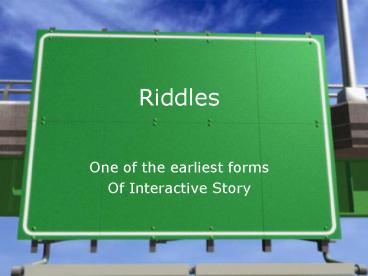Riddles - PowerPoint PPT Presentation
1 / 22
Title:
Riddles
Description:
Riddles One of the earliest forms Of Interactive Story Early comparisons Game, Story, Novel, Puzzle Poetry (Novak 1991) Interactive Fiction is computer gaming s ... – PowerPoint PPT presentation
Number of Views:428
Avg rating:3.0/5.0
Title: Riddles
1
Riddles
- One of the earliest forms
- Of Interactive Story
2
Early comparisons
- Game, Story, Novel, Puzzle
- Poetry (Novak 1991)
- Interactive Fiction is computer gamings best
parallel with poetry complex, subtle, and these
days, absolutely unsaleable (Guest 2002)
3
Riddle
- Ancient
- Dismissed as being a diversion for children.
- Riddle is often considered poetry (Riddle is a
short lyric poem that poses a question, the
answer to which lies hidden in hints Turco 1986)
4
Riddle
- Poses a question
- Answered by reader or listener or riddlee.
- Folk riddles A riddle is a traditional verbal
expression which contains one or more descriptive
elements, a pair of which may be in opposition.
5
Riddle
- Covered with eyes, but it cant see.
- I tremble at each breath of air and yet can
heaviest burdens bear
6
Joke
- How many Freshmen does it take to screw in a
lightbulb? - Response format, not a riddle since they do not
describe something that is genuinely to be
guessed, but rather provide the set up for a
punch line.
7
Other non-riddles
- Whats that thing on top of the engine that
controls the mix of fuel and air? - Simply asking for a term, not offered to be
guessed but rather in the hopes of learning the
answer.
8
Other non-riddles
- Mathematical problems.
- Situational puzzle
- A man walks into a bar and asks for a drink. The
bartender pulls out a gun and points it at him.
The man says, Thank you and walks out. - Yes or no questions to figure out why it works
9
Riddles
- Meant to challenge the listener but to be
soluble, rather than those meant to be insoluble
or those not intended to challenge. - Excellent riddles have to be both enjoyably
challenging yet soluble with the information
provided.
10
Riddles
- The unique quality of the riddle as communication
is that it engages the attention of the riddlee
in particular ways and contains a test for its
success. Both parties must be engaged.
11
Mystery novels
- Like a riddle but reader doesnt explicitly need
to solve the mystery - Ridlee needs to turn the unknown and unfamiliar
into the familiar in order to know the answer.
12
Excellence
- Must have some agreement between riddler and
riddlee. - Author is obliged to pose a riddle that is
tantillizing in its opacity, yet fair in the
clues it provides. - Riddlee is obliged to solve the riddle, to
announce the solution and explain the
riddle-question and how each of the clues operate.
13
Arrangement
- Aristotles Rhetoric
- Pattern of Surprise
- Then delay
- Then excited recognition
14
Early riddles
- As old as time, before writing.
- Early surviving riddles from Babylon
- Who becomes pregnant without conceiving, who
becomes fat without eating?
15
History
- Sacred texts contain riddles
- Well-regarded in ancient Greece.
- Legend says that Homer was confounded by a riddle
and died of frustration.
16
History
- Riddle of the Sphinx from Oedipus
- What is that which has one voice and yet becomes
four-footed and two-footed and three-footed? - 18th Century Riddles were very popular.
- After that, riddles became more for kids than
adults.
17
Poetry and Riddles
- Principles by Howard Nemerov
- A poem must seem very mysterious.
- But it must have an answer (a meaning) which is
precise, literal, and total that is,which
accounts for every item in the poem. - It must remain very mysterious, or even become
more so,when you know the answer.
18
Principles
- Invite the interactor to solve the riddle, by
being enigmatic in a certain way or by presenting
something to be solved that is alluring. - Stimulate the curiosity.
19
Principles
- 2. Provides for the economy of objects in the
world. If there are red herrings, they must add
to the meaning, even if otherwise extraneous.
20
Principles
- 3. When the explicit mysteris of an interactive
fiction are solved, a work that becomes more
profoundly mysterious can be played again with
interest even when the solution is known.
21
Examples
- Where did Pilgrims land when they arrived in
America? - When do elephants have 8 feet?
- What gets wetter and wetter the more it dries?
- You throw away the outside and cook the inside.
Then you eat the outside and throw away the
inside. What did you eat?
22
Examples
- What goes up and down the stairs without moving?
- What can you catch but not throw?

